Johnson & Johnson says it is going to release one billion coronavirus vaccines next year
Johnson & Johnson has outlaid plans to get vaccine trials up and running by September and the number of shots the pharmaceutical behemoth plans to have ready is astounding.
Coronavirus
Don't miss out on the headlines from Coronavirus. Followed categories will be added to My News.
Healthcare giant Johnson & Johnson is ramping up manufacturing and aims to produce a billion coronavirus vaccines for next year, according to Dr. Paul Stoffels, the company’s chief scientific officer.
“We start clinical trials in September and hopefully have data by the end of the year,” Dr. Stoffels said on ABC’s This Week on Sunday, local time, adding that the company is “now working towards one billion vaccines for next year.”
Johnson & Johnson says it will start producing the vaccine later this year, with Dr. Stoffels saying “clinical trials will need to be done to show that it is effective, and that will take some time.”
He added: “We will have some vaccine available this year, but it will depend on the authorities – the FDA and others – to decide whether it can be used earlier, before efficacy data are available.”
Dr. Paul Stoffels, Johnson & Johnson chief scientific officer, says COVID-19 is spreading "so fast" around the world and it won’t pass without a vaccine.
— This Week (@ThisWeekABC) May 10, 2020
Clinical trials begin in September with “the aim to deliver 1 billion vaccines next year," he adds. https://t.co/6djLPlt9j1 pic.twitter.com/72kgtLA0Hg
When asked if the virus could disappear eventually by itself, Dr. Stoffels was not positive, saying:
“It’s now spreading around the world so fast and so significant that they will need a vaccine to control it,” he said.
His view contradicted that of US President Donald Trump who questioned on Friday local time whether a vaccine would be necessary to stop the pandemic, saying “at some point it will probably go away by itself.”
US PREPARES FOR ‘RISKY’ HUMAN TRIALS
The US government is preparing to launch COVID-19 “human challenge trials” which would involve deliberately injecting healthy volunteers with the virus.
Scientists are hoping the trials will accelerate development of a vaccine. The director of the National Institutes of Health, Francis Collins, has tasked the institute’s vaccine working group with writing “a perspective on the scientific and practical considerations for a COVID-19 human challenge model.”
The group will meet on May 11 to discuss the issue. Historically, deliberately infecting volunteers will reap faster results than waiting for infection to occur in the community but they come with considerable risk.
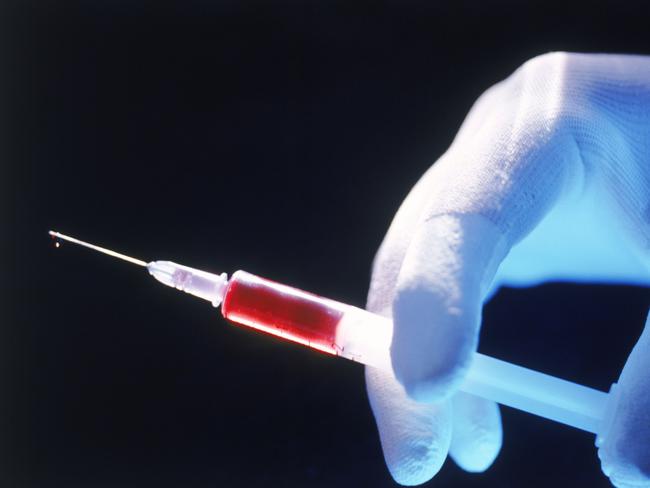
Scientists say that the need for a coronavirus vaccine is so urgent, research funders should be currently preparing to roll out human infection trials as soon as possible after potential vaccines have completed the initial safety testing phase.
There are around 100 coronavirus vaccines currently in the development phase around the world. More than 14,000 volunteers have already signed up to participate in the trials via an online register run by US-based vaccine advocacy group 1DaySooner.
Paul Stoffels, chief scientist at Johnson & Johnson, has said that his company would consider a human challenge trial but emphasised that there are major ethical considerations to be taken into account. Dr Stoffels said that infecting people was “very challenging” while there is no drug or antibody therapy to treat the disease.
If the ethical committees, or the ethical world accepts that is do-able, we will join,” he said. “But we are not counting on it at the moment.”
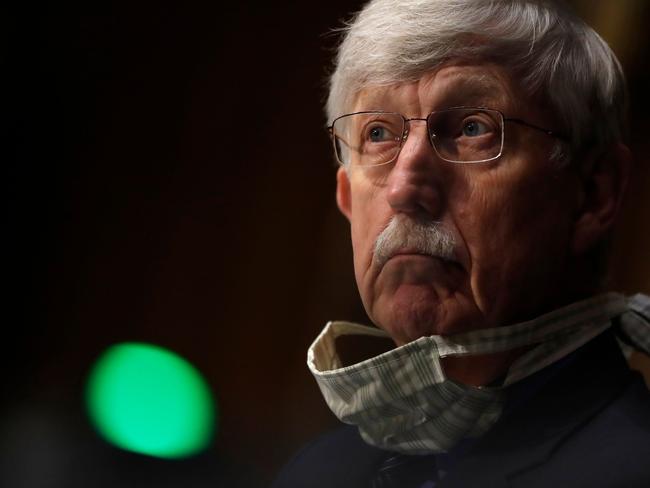
Dr Marco Cavaleri, head of the European Medicine Agency’s vaccines strategy, shared his sentiments.
“Such studies must provide not only volunteers but also the professionals looking after them with maximum protection against any harm from infection, including possible long-term consequences,” Dr Cavaleri said.
The World Health Organisation has issued a 19-page document outlining the “key criteria for the ethical acceptability of COVID-19 human challenge studies”.
The recommendations include limiting studies to healthy young adults between 18 to 30, in whom fatal infection rates are only around 0.03 per cent, while the NIH is considering the logistics of arranging a secure facility where participants and staff can stay for four weeks while the trials take place.
They are also discussing developing a special strain of the virus with reduced virulence to use in the trials.
AUSSIE COVID-19 VACCINE ‘AT THE FOREFRONT’
Exclusive: The Netherlands laboratory testing the University of Queensland vaccine says the Australian inoculation was at the “forefront” of coronavirus science.
Viroclinics Xplore, based in Rotterdam, has been testing the UQ drug, with results expected to be made public within weeks.
The company has also been trialling other COVID-19 vaccines, but the UQ vaccine was “really serious”.
The UQ was likely to become one of several potentially successful vaccines, with the University of Oxford also among world leading research.
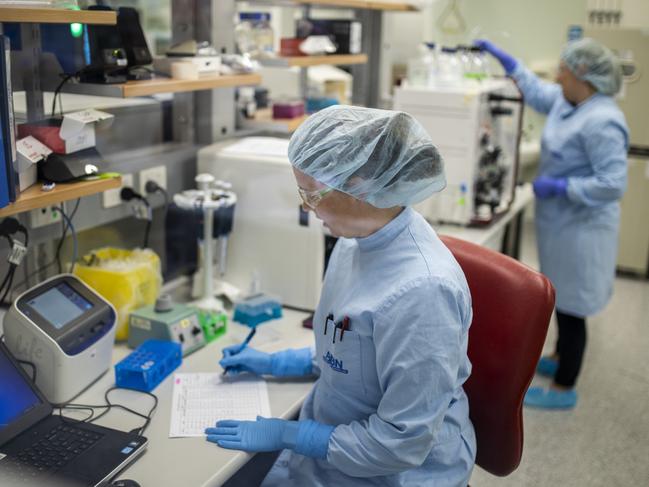
Bob van Gemen, chief executive of Viroclinics Xplore, told News Corp Australia in an exclusive interview, that the University of Queensland was at the “forefront” of coronavirus science.
“If you just look at who is working on COVID-19 you know that there are hundreds of small companies that think they have the drug or a vaccine or something that can be helpful,” he said.
“They all want it tested, there’s a lot of testing going on of all of this stuff and there is a number of big pharma that has serious programs with new or existing drugs or vaccines.
“There’s a lot going on COVID-19. Queensland is one of the many but at least they are very much at the forefront of something that could actually be extremely good.”
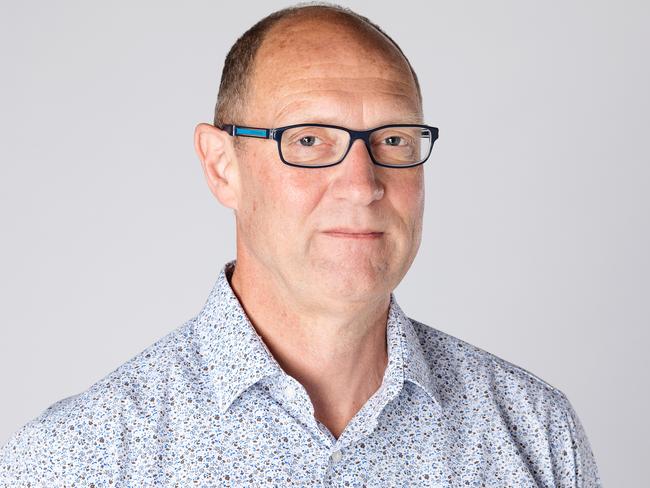
Joint UQ project leader Dr Keith Chappell said the team had decided early on that ensuring a robust package of preclinical and safety data was critical before initiating a clinical trial, and they hoped to have those results in early June.
“Viroclinics Xplore is investigating in more detail the vaccine’s ability to protect from direct challenge by the live virus in multiple animal models, and without this partnership this just wouldn’t have been possible in this time frame with the capabilities we have here in Australia,” Dr Chappell said.
The UQ vaccine was developed with the assistance of the Peter Doherty Institute in Melbourne.
Results released last week showed the vaccine had been able to produce antibodies against coronavirus.
University of Melbourne Professor Kanta Subbarao, from the Doherty Institute, tested samples provided by the UQ team and found high levels of antibodies capable of neutralising infection by the live virus in cell culture.
“This is a very important finding because similar immune responses with SARS vaccines in animal models were shown to lead to protection from infection,” Professor Subbarao said.
Mr van Gemen, has been at the helm of Viroclinics Biosciences, which controls its Xplore brand, since 2011.
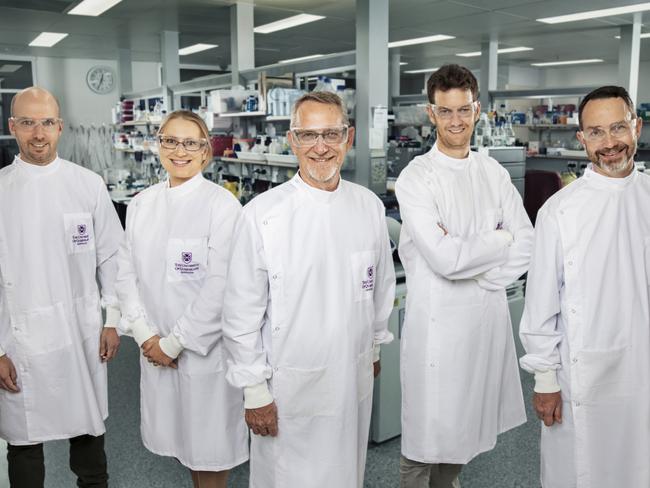
“I think it’s reassuring that there are so many working on (a vaccine). It makes our chance of finding a good vaccine and a good antiviral relatively good,” he said.
“The Queensland work is really serious, good science behind it. Maybe not all of the initiatives have that science behind it, some are a little bit more optimistic.”
The company has up to 40 of its 250 scientists testing the UQ vaccine candidate, with hundreds of tests being done each day.
It acquired a new company DDL Diagnostic Laboratory in March, which has expanded its testing ability.
The level-three Rotterdam laboratory has been working with the live virus in its trials, injecting it into animals, commonly hamsters, to see if it safe for further human trials.
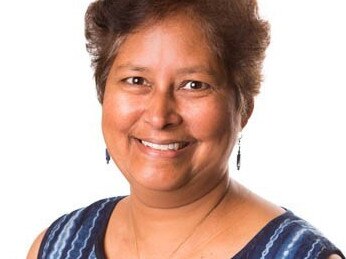
The tests were “sophisticated” and therefore took more time than standard testing for COVID-19 patients.
Mr van Gemen was unable to comment specifically on the UQ results or research, but said that commonly two groups of less than 10 animals were used in trials.
Viroclinics also has a laboratory in China, but it is not being used for any part of the UQ work.
The company also said it had high teach anti-hacking software to protect lab and results data.
The global coronavirus pandemic had led to a shortage of some personal protective equipment for Viroclinics’ scientists, but they managed to overcome the problem.
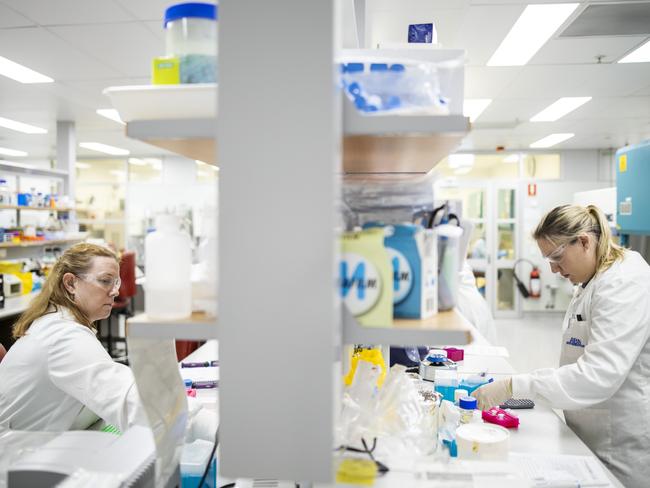
“Working with COVID-19 in high amounts, for all the essays that we do with the live virus we need really serious personal protection masks, not the cheap ones we need the good ones,” he said.
“So far we have been extremely creative in finding masks for instance, we went to building sites to see if they had any masks they weren’t using that we could use,” Mr van Gemen said.
“Because it’s such a global issue everybody is struggling, how do you deal with that, there’s not enough.”
The Coalition for Epidemic Preparedness Innovations (CEPI) asked UQ to fast track its vaccine using molecular clamp technology in January.
They expect to do human trials from “third quarter of 2020” if preclinical work was successful.
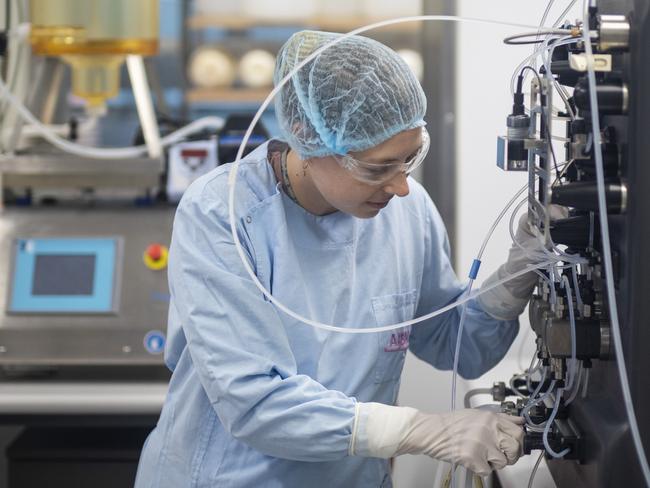
Health Minister Greg Hunt’s office said: “The Australian Government has contributed to the University of Queensland’s COVID-19 vaccine development project in partnership with the Queensland Government and the Paul Ramsay Foundation.
“While the Government has made a significant contribution to the University of Queensland’s vaccine development work, the University operates with autonomy for its management of the process, including how it selects, works with, and provides funding to its collaborating partners.
“The World Health Organization has reported that over 80 COVID-19 vaccines are currently in development across the world. It is possible that more than one vaccine may be found to be both safe and effective, which could benefit access to vaccines across the world.”
UQ VACCINE KEY PLAYERS
Professor Trent Munro: UQ vaccine program director is the senior group leader at Australian Institute for Bioengineering and Nanotechnology. He previously worked at Amgen in California where he was responsible for getting drugs to clinical trials and then launched on the market.
Dr Keith Chappell: A homegrown UQ scientist. He did a PhD at UQ in 2007 before jetting off to Spain’s Instituto Salud Carlos III for three years. In Spain he worked on respiratory viruses and their antibodies. He returned to UQ in 2011 where he worked on the flu, ebola, Koala Retrovirus, Respiratory Syncytial virus (RSV), Dengue virus (Den), and West Nile Virus (WNV).
Professor Kanta Subbarao: Prof Subbarao has been the World Health Organisation’s kingpin on influenza research at its Melbourne laboratory since 2016. She is also part of the Doherty Institute and did antibody testing on the UQ vaccine. Prior to arriving in Melbourne, Prof Subbarao was the boss of respiratory viruses at NIAID, National Institutes of Health (NIH) in the United States, for 14 years.
Professor Paul Young: Head of School of Chemistry and Molecular Biosciences at UQ and co-leader on the vaccine. He studied at the London School of Hygiene and Tropical Medicine in 1986, before joining UQ in 1991. An expert on ebola and dengue fever.
Originally published as Johnson & Johnson says it is going to release one billion coronavirus vaccines next year
